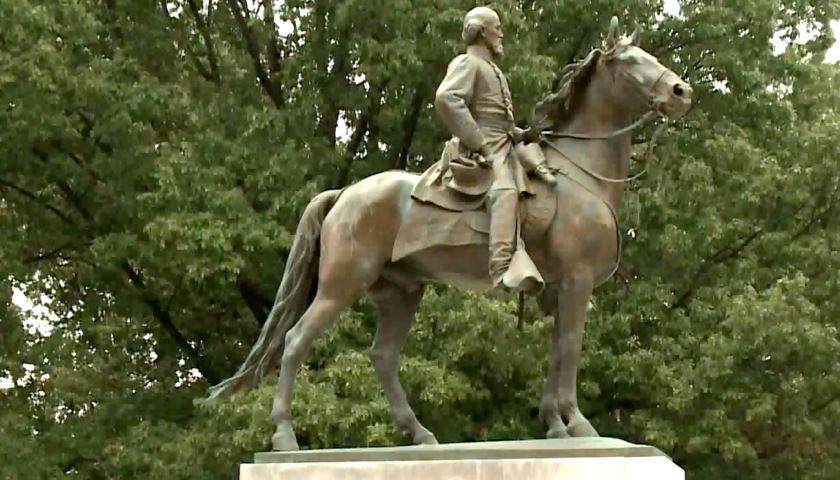by Don Barnett
There is little argument that the Memphis City Council pulled a fast one in its decision to circumvent state law by selling two of its city parks to a nonprofit, which then immediately removed statues of Confederate General Nathan Bedford Forrest, President Jefferson Davis and the uncontroversial Capt. J. Harvey Mathes on December 20, 2017.
The removal had been a point of contention for years and much of the political class applauded the novel approach to the problem. It is worth remembering, however, that removal booster Memphis Rep. Steve Cohen voted against the removal of the Forrest statue in 1984 when he was on the Memphis city council.
Direct descendants of Nathan Bedford Forrest filed a lawsuit on Dec 17, 2018 against the city of Memphis over the removal of the statue from the gravesite of the Confederate general, his wife and, likely, others who were interred on the grounds earlier. It may be the first time that living descendants of a national historical figure have filed such a suit to protect their ancestor’s grave site.
The chances of open discussion of the matter are looking pretty dim based on media handling of the issue so far.
The Commercial Appeal ran a story by freelance journalist Ed Hooper about the lawsuit brought by H. Edward Phillips challenging the legality of the maneuver. Attorneys allege in the filing they have a paper trail showing the city knowingly violated its own charter, conspired to violate state law; desecrated a grave, trespassed on a grave and conspired to violate the Civil Rights of the Forrest Family when they removed the monument.
The article was taken down from the Commercial Appeal website within a day because, according to the editor Mark Russell, the author of the article had written an op-ed earlier that was ‘critical of Memphis and the removal of the Nathan Bedford Forrest statue’. So much for the profession of journalism as the 4th estate or ‘speaking truth to power’. 100% favorable opinion and reporting only please.
Since much of news reporting in Tennessee resides in the ‘content management’ computer system of the Gannett News Service, the article simultaneously disappeared from the Jackson Sun and the Knoxville News Sentinel as well as the Memphis Commercial Appeal.
A replacement news article on the lawsuit came out by Commercial Appeal staff without any quotes from the plaintiff’s side. This article went to all the Gannett sites including The Tennessean, which ran it in its print edition on Dec, 19, 2018. Mysteriously, the report either never made it to the electronic archives of The Tennessean or was taken down the day after it appeared in print.
Asking to see the original offending news article about the lawsuit, I was told by the Commercial Appeal editor Mark Russell that the original article ‘no longer exists’. In the digital world does anything ever completely disappear without a whole lot of effort? According to Mr. Russell, the earlier critical-of-Memphis piece which made the current news article about the lawsuit so offensive was an op-ed likening the removal of the statues to an ‘art heist’. The Forrest statue alone, done by highly collectible American sculptor Charles Neihaus, could be worth as much as 6 million dollars. The Memphis City Council sold it and the land to an NGO headed up by Shelby County Commission member Van Turner for $1,000. What else could you call it?
The ‘art heist’ op-ed had run in The Tennessean on Jan 14, 2018. Low and behold, it too was taken down from The Tennessean website sometime later. Note to digital clean-up crew: if you want to remove all traces of an article, make sure you remove all letters-to-the-editor relating to the article. At any rate, the op-ed can still be found on the Knoxville News Sentinel website – another example of how hard it is to completely erase a digital article.
The author, freelancer Ed Hooper, in his capacity as a ‘critic’ helped save George Jordan, the first African American recipient of the Congressional Medal of Honor from obscurity. After a 20-year search for artifacts of his life and military service, he found and forwarded Jordan’s actual Medal of Honor to the Smithsonian’s Museum of African American History and Culture last year. His biographical work collected on the Tennessean was used by students to name the newest elementary school in Williamson county after the native son. Mr. Hooper, as well as lead plaintiff’s lawyer in the Forrest statue case H Edward Phillips, helped save Nashville’s Fort Negley from developers.
Some have argued it was removal booster Megan Berry’s scandal that ultimately saved Fort Negley, a significant site in African American history. The mayor was just too distracted to push development plans.
Defenders of Fort Negley argued that the Tennessee Heritage Act protected the site. It was evasion of the Heritage Act that led the Memphis City Council to sell its city parks to an NGO. If the park no longer belongs to the city, then it is no longer subject to the Heritage Act.
Chalk one up for social justice? Well, maybe, maybe not. Maybe the social justice warriors are just foot soldiers for developers and other 1 percenters.
According to various sources, the UT Board of Trustees has been salivating over this piece of land for years.
The former Forrest park site, situated as it is on the UT medical school campus, is an excellent building site – maybe it should get a new building to be named for the father-in-law of Bill Haslam, another removal booster?
There are many important questions to be addressed, not to mention the plans for the statues whose whereabouts are still an official secret. As the site of the city hospital in the 19th century, the grounds of the park doubtless hold the remains of paupers who had nowhere else to be buried and possibly the remains of United States Colored Troops.
No one here is denying that Nathan Bedford Forrest and Jefferson Davis are a problem for Memphis – and for America, but this matter touches on other large questions as well, such as sphere sovereignty, federalism, states’ rights, home rule and yes, even ‘social justice’. It is a shame it won’t have the discussion we need in today’s social climate.
Read the lawsuit here:
[pdf-embedder url=”https://tennesseestar.com/wp-content/uploads/2019/01/Barnett_The-Descendants-of-General-Nathan-Bedford-Forrest-et.-al.-v.-The-City-of-Memphis-et.-al.-Shelby-Co-Chancery-Court-No.-CH-18-1787-Part-I-As-Filed-4.pdf” title=”Barnett_The Descendants of General Nathan Bedford Forrest, et. al. v. The City of Memphis et. al. (Shelby Co, Chancery Court No. CH-18-1787-Part I) As Filed (4)”]
– – –
Don Barnett is a freelance writer living in Brentwood, TN. He has been published in various national media outlets.









I agree with Mark Thomey and Anne Foard. ‘Sound bite history’ is a good way to describe it. BUT, the piece was about the gatekeepers’ (meaning media and politicos) handling and hiding of news. Further, if Forrest is redeemed because he changed his views then his previous views must have been a problem. The statues do not commemorate the post-war, post-conversion Forrest. To have written the piece without at least a nod to what makes Forrest and Davis controversial would have been ridiculous.
Follow the money!
So you honestly think slavery was THE issue? Answer this why was West Virginia admitted to the Union as a “slave state” during the war? Or Lincoln’s own speeches stating he had no intention into making the slavery issue a war Aim nor did he think he could. Furthermore, he enforced the Fugitive Slave Act during the war up until midday during the war. Show me one official declaration by either Congress Union or Confederacy that specifically mentions slavery as a War Aim Resolution. There aren’t any! In fact the Union passed the Corwin amendment supported by both James Buchanan and Abraham Lincoln in March 1861 before the war started to allow each state choose to be a slave or free state unfettered into perpetuity.But, the issue wasn’t at all primary to the South so they seceded accordingly . Along with Abraham Lincoln, the Historian David Kaplan ‘s book’s other key figure is a real compassionate president John Quincy Adams. Beginning in 1830, after serving a term as president, Adams was elected several times to the House of Representatives, where he led the fight against the “gag rule,” which barred discussion of abolitionist petitions. Kaplan is mostly interested in Adams in order to contrast him, an “antislavery activist,” with Lincoln, an “antislavery moralist” — someone who spoke against slavery but failed to take action against it. Adams believed in the citizenship of free blacks; Lincoln did not. Lincoln “put all his hopes” for ending slavery in the American Colonization Society, which advocated encouraging or requiring free blacks and emancipated slaves to emigrate to Africa, while Adams considered colonization impractical and unethical. Adams insisted that in a war the president could invoke his power as commander-in-chief to abolish slavery; Lincoln moved toward emancipation only slowly and reluctantly, and when he did issue the Emancipation Proclamation, he exempted about three-quarters of a million slaves in parts of the Confederacy and in the four border slave states that remained in the Union. Lincoln’s reluctance to act decisively against slavery, Kaplan argues… But the deepest reason for his hesitation was racism: Lincoln believed that America “was and always should be a white man’s country.”
It’s not just the Gannett Newspaper syndicate that thwarts the ability of those with something to say, denies a venue and blocks a window to what the people want to see – the news. There are countless other such syndicates across the nation that apply their liberal bias to the thumb of democracy and press their stamp of control into what is a dying industry of the printed word journalism. I have had great difficulty in getting out the Southern voice to the people, no matter how much effort is applied. The dinosaurs will eat each other alive on the way to the bone yard. Meanwhile the common citizens are uniting to spit out volumes of real-time events, faster than the a speeding bullet; swifter than a locomotive… Tomorrow is in the present and the past is just a ghost wisping its way out the door – a victim of its own constipation.
I am in complete agreement with Mark Thomey above; characterizing Forrest and Davis as “problems for the entire country” indicates that the soundbite version of history may be a problem here. No, Forrest was not the founder of the KKK, and yes he did do many very positive things for African-Americans in particular and Memphis in general after the War, and no, Davis was not a traitor but rather a statesman and politician with long experience who took a job he didn’t want in order to stand up for his principles. Those issues aside, thanks for a very clear explication of the legal situation surrounding the Forrest statue and other artifacts, and for revealing the very disturbing actions of the media in a country that is thought to have the best journalism in the world. Apparently not always.
Haven’t you ever noticed that most dirty deeds are done “after dark”? They knew when they did it that it was wrong. Not just wrong, but low, low as in snake’s belly kind of low. Which is a fairly appropriate analogy!
The federal judiciary is overriding a state’s prerogative to override municipal decisions about monuments. Eventually it will be Goodbye Fort Negley.
https://www.msn.com/en-us/news/us/judge-voids-alabama-law-protecting-confederate-monuments/ar-BBSh8ev?ocid=spartanntp
And next will be Ft. Nashborough . To the Left it symbolizes European colonialism.
Your last paragraph is the epitome of irony, as General Forrest and President Davis took the stand they did for the very concepts of sphere of sovereignty, States’ Rights, federalism and home rule. Preserving THOSE THINGS for the South is precisely why the Confederacy was fighting for her independence. So, yes, I can surely see why being reminded of such an ‘inconvenient truth’ would be a problem for Memphis and contemporary america. They no longer understand, value or defend any of those ideals. God save the South.